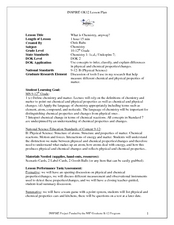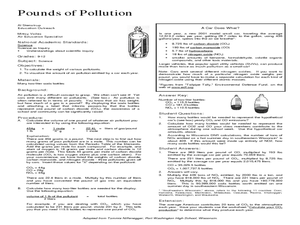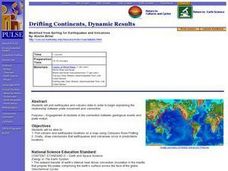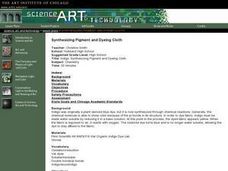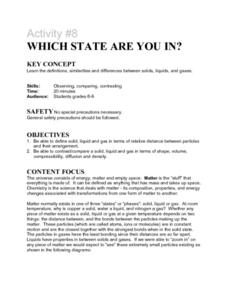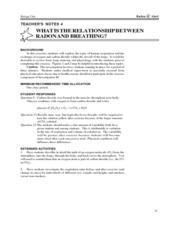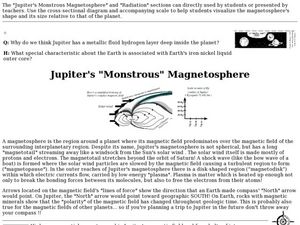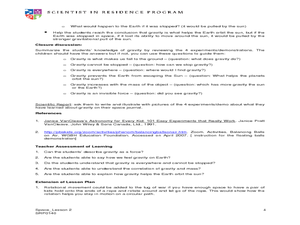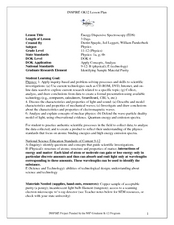Curated OER
Reading Labels For Fat Types
Students analyze a variety of cooking oils to determine the amount and types of fats included in each.
Curated OER
What Is Chemistry, Anyway?
Students differentiate physical and chemical change. In this chemistry lesson, students list examples of those changes. They apply what they learned in a Jeopardy style team game.
Curated OER
Mechanical, Electrical and Radiant Energy
Students write a hypothesis and complete a lab. For this investigative lesson students complete their lab and a worksheet about energy.
Curated OER
Pounds of Pollution
Students examine pollutants and investigate air pollution emitted by a car in a year. In this air pollution lesson plan students complete an activity and make calculations.
Curated OER
Bouncing Balls
Students create a polymer to demonstrate its properties and develop an awareness of the wide variety of uses for polymers.
Curated OER
Coefficient of Kinetic Friction and Surface Area
Students investigate coefficient of friction with respect to surface area and applied force in contact with the sliding force.
Curated OER
Dissolved Oxygen Lesson
Students investigate what dissolved oxygen is and why it is important to aquatic life and what factors influence levels of dissolved oxygen in a lake. They study how to use MS Excel to make charts to show trends and correlations.
Curated OER
The Genetic Basis of Neurological Disorders
High schoolers describe some aspects of known genetic defects on the human neurological condition. They participate in a variety of exercises including drawings, games, and analogies.
Curated OER
Urban Impact on Chollas Creek (California): A Field Study
Students, in groups, take samples from a creek and keep a field journal on their samples. They also perform tests on their samples.
Curated OER
Drifting Continents, Dynamic Results
High schoolers plot earthquake and volcano data using a Compass Rose Plotting. They explain the relationship between plate movement and connection. They draw conclusions that earthquakes and volcanoes occur in predictable locations.
Curated OER
Losing An Island
Students examine carbon dioxide and determine the impact of greenhouse gases on the earths spheres. In this pollution lesson students complete a lab activity to see the impact of gases on the environment,
Curated OER
Synthesizing Pigment and Dyeing Cloth
Young scholars create a synthetic dye and oxidize the dye and record the effects.
Curated OER
Aurora Borealis
Students discuss what causes the northern lights and the folklore attached to them. They discuss magnetic fields, and use various common materials to discover if ions conduct electricity.
Curated OER
Activity #8 Which State Are You In?
Young scholars define, give similarites and differences between solids, liquids, and gases. They compare and contrast a solid, liquid and gas in terms of shape, volume, compressibility, diffusion and density. Pupils classigy common...
Curated OER
Water Chemistry
Students engage in a lesson that is concerned with the concept of water chemistry. They conduct research using a variety of resources. Students also consider an experiment to observe how water has the abiility to exist as three different...
Curated OER
The Great Gas Race
Fourth graders improve their understanding of Graham's Law by using properties of gases to evaluate the rate of effusion of two compounds as they vaporize. They engage in a lab which elevates their understanding of the properties of gases.
Curated OER
What Is The Relationship Between Radon and Breathing?
High schoolers examine the effects of radon on their breathing. They review the anatomy of the respiratory system before completeing this lesson plan. They also complete equations to show how carbon dioxide forms in their body.
Curated OER
Extraction of DNA from White Onion
High schoolers conduct lab test with minced onion to determine where chromosonal DNA is located within the cell, and whether or not it can be extracted.
Curated OER
Jupiter's "Monstrous" Magnetosphere
Students explore Jupiter's magnetosphere. In this Jupiter lesson, students examine a diagram of the magnetic field that surrounds Jupiter.
Curated OER
Heat and Matter
Students explore liquids and solids by conducting in class experiments. In this matter lesson, students define the properties of matter and how heat can change those properties. Students experiment with heating objects such as butter and...
Curated OER
Gravity - The Glue of the Universe
Students explore physics by conducting a class experiment. For this gravitational force lesson, students define several scientific terms associated with force. Students utilize a styrofoam cup and marbles to simulate a satellite crashing...
Curated OER
Energy Dispersive Spectroscopy
Students calculate the values of electron binding energies. In this physics lesson, students solve for different wavelength characteristics of X-rays. They present their findings to the class.
Curated OER
Grating Spectrometer
Students calculate the Balmer series. In this physics lesson, students observe hydrogen lamp spectra using spectrometers. They calculate wavelength and compare them with their theoretical calculations.

